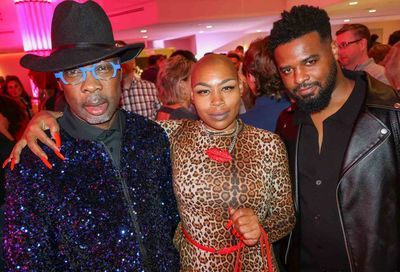Forum: Sex Work is Work
Decriminalizing sex work is a step that can start a monumental series of changes in our community
In June, The DC Center for the LGBT Community erupted with anger and sadness as news spread of a weekend filled with anti-LGBTQ hate crimes. As the details of Zoe Spears’ death, marking the 10th transgender woman of color to be murdered this year, spread, it once again became clear that the targeting of Black Trans Women Sex Workers is an epidemic that needs attention and action. At The DC Center, we are constantly hearing stories from the black, trans, working community of harassment imposed by the current legislation in D.C. We are dedicated to ensuring the safety of those in our community and feel that decriminalizing sex work is the best way to ensure those who are working on the streets have access to resources and safety they need to survive.
The concept of sex work is a broad umbrella term that encompasses many different professions, but overall, sex work is a way for people to provide for themselves. Decriminalizing sex work promotes a safe environment for persons involved, enabling them to earn a living without being stigmatized, victimized, or arrested. Decriminalization is opposed to legalizing sex work, which would place bureaucratic controlled regulations leading to further discrimination.
Under current D.C. law, sex workers are more likely to experience violence from different actors in their community, from those who purchase sex, and the police who are expected to protect them. While sex work is not inherently violent, the criminalization places sex workers at higher risk. Because of the fear of arrest, sex workers often move to isolated areas to avoid the watchful eye of police and thus put themselves in more danger of being victims of violence. When sex workers experience violence, they are unable to report it to the police because they will receive legal repercussions, and this leads to a spherical effect of violence. Criminalization pits police and sex workers against each other, allowing for violence to permit and for the vulnerable members of our community to be continuously victimized. By decriminalizing sex work, it empowers the workers to come forward and report violence, without fear of arrests or other repercussions.
Furthermore, decriminalization will lead to the most significant opportunity for funding for health programs, which may include better access to condoms, safety screenings of clients, reduction of STIs and sexual abuse, and sex worker-led programs. The combination of programs provided to sex workers and the lack of fear of harm or arrest would enable workers to access health services without discrimination from healthcare providers.
In a society that criminalizes sex work, black and brown women, girls, trans and gender non-conforming folks are victimized continuously at a higher rate than other communities. Current laws intrude into private behaviors of women and LGBTQ people who make up the majority of sex workers worldwide, and this hurts our entire community. When one of us is down, we all fall, which is why it is crucial that we all join the fight to decriminalize sex work.
This year, the Community Safety and Health Amendment Act of 2019 was introduced into the D.C. Council. If passed, it would increase the public health and access to safety by removing criminal penalties associated with sex work. This bill would not only decriminalize sex work, but it would create measures to ensure safety for our communities.
The call to support sex workers in the effort of decriminalization falls on all of us — members of the LGBTQ community, straight and cis allies, and every member of the D.C. community. If the council passes the bill, we will be one step closer to ensuring safety for our female and trans, Black and brown, old and young, and all other community members who need protection from violence. We may be one step closer to ensuring that another trans woman of color isn’t killed for trying to make just enough money for dinner. We may be one step closer to ensuring that all of us are safe from stigma, persecution, and discrimination. Decriminalizing sex work is a straightforward step, but it is a step that can start a monumental series of changes in our community.
Alexis Arrington is a third-year student at American University, originally hailing from San Diego, Calif. Currently, she is interning at The DC Center as a Social Media and Advocacy Intern.
The opinions expressed in Forum do not necessarily reflect those of Metro Weekly or its employees. Add your voice to Forum. Learn how at www.metroweekly.com/forum.
Support Metro Weekly’s Journalism
These are challenging times for news organizations. And yet it’s crucial we stay active and provide vital resources and information to both our local readers and the world. So won’t you please take a moment and consider supporting Metro Weekly with a membership? For as little as $5 a month, you can help ensure Metro Weekly magazine and MetroWeekly.com remain free, viable resources as we provide the best, most diverse, culturally-resonant LGBTQ coverage in both the D.C. region and around the world. Memberships come with exclusive perks and discounts, your own personal digital delivery of each week’s magazine (and an archive), access to our Member's Lounge when it launches this fall, and exclusive members-only items like Metro Weekly Membership Mugs and Tote Bags! Check out all our membership levels here and please join us today!




















